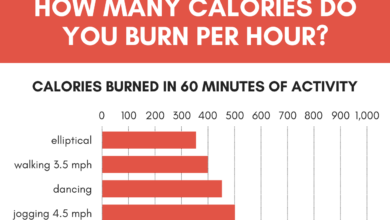
Does Meal Timing Matter for Losing Weight?
Does meal timing matter for losing weight? This question has sparked countless debates among health enthusiasts and weight loss experts. While calorie intake and expenditure remain fundamental to weight management, recent research suggests that the timing of meals might play a significant role in achieving weight loss goals.
This article delves into the science behind meal timing and explores various strategies, including intermittent fasting and time-restricted feeding, to help you navigate the complexities of this fascinating topic.
From understanding the role of metabolism and its connection to meal timing to exploring the potential benefits and risks of different strategies, we aim to provide a comprehensive overview of meal timing and its implications for weight loss. This exploration will help you make informed decisions about incorporating meal timing strategies into your weight management journey.
The Science Behind Meal Timing and Weight Loss
Meal timing, or the time of day you eat, has become a popular topic in the world of weight loss. While it’s not a magic bullet, there’s growing scientific evidence suggesting that meal timing can play a role in managing weight.
The Role of Metabolism and Meal Timing
Metabolism refers to all the chemical processes that occur in your body to maintain life. It includes processes like digestion, energy production, and tissue repair. Metabolism is influenced by various factors, including genetics, age, activity levels, and yes, meal timing.
One aspect of metabolism that’s particularly relevant to weight loss is the basal metabolic rate (BMR). This is the number of calories your body burns at rest to maintain basic functions like breathing and heartbeat. Research suggests that meal timing can influence BMR.
For example, studies have shown that eating earlier in the day might lead to a higher BMR compared to eating later in the day. This is because the body’s natural circadian rhythm, which regulates sleep-wake cycles, also influences metabolism. While more research is needed, the findings suggest that aligning your eating patterns with your natural circadian rhythm could be beneficial for weight management.
Calorie Intake and Expenditure
The fundamental principle of weight loss is simple: You need to consume fewer calories than you burn. This calorie deficit creates a negative energy balance, forcing your body to use stored fat for energy, resulting in weight loss. Meal timing can indirectly affect calorie intake and expenditure.
The debate about whether meal timing matters for weight loss is ongoing, with some studies suggesting it can be helpful, while others argue it’s less important than overall calorie intake. But one thing’s for sure: sometimes a change of scenery can be the catalyst for major transformation.
Take Charlotte, for example, who, as you can read in this inspiring article, how a vacation helped charlotte lose half her body weight , completely overhauled her lifestyle and lost half her body weight! So, while meal timing might play a role, ultimately, finding a sustainable approach that works for you is key, and sometimes that means stepping outside your comfort zone.
For instance, if you eat a large meal close to bedtime, your body might not have enough time to digest and burn those calories before you go to sleep, potentially leading to increased fat storage. On the other hand, eating earlier in the day could allow for better calorie utilization and potentially increase your overall energy expenditure through daily activities.
Does meal timing matter for weight loss? It’s a question that sparks debate among experts, but one thing’s for sure: staying sane during a hectic work-from-home schedule is crucial for healthy habits. If you find yourself struggling to maintain a consistent routine, check out these 10 ways to stay sane when working from home for some helpful tips.
After all, a balanced mind can lead to better choices, including those related to meal timing and overall weight management.
Research Findings on Meal Frequency and Weight Management
The impact of meal frequency on weight management is a complex area of study. Two popular approaches are intermittent fasting and frequent small meals.
Intermittent Fasting
Intermittent fasting involves alternating periods of eating and fasting. There are various methods, including the 16/8 method (fasting for 16 hours and eating within an 8-hour window) and the 5:2 method (eating normally for 5 days and restricting calories to 500-600 for 2 days).
Studies have shown that intermittent fasting can lead to weight loss, improved insulin sensitivity, and reduced inflammation. However, it’s crucial to note that not everyone is suitable for intermittent fasting, and it should be done under the guidance of a healthcare professional.
Frequent Small Meals
This approach involves eating smaller, more frequent meals throughout the day, typically 5-6 times a day. The idea is to keep your metabolism elevated and prevent large fluctuations in blood sugar levels. Some research suggests that frequent small meals might lead to improved satiety, reduced hunger pangs, and potentially better weight management.
However, more research is needed to confirm these benefits. It’s important to remember that both intermittent fasting and frequent small meals are just tools for weight management. They should be combined with a healthy diet and regular exercise for optimal results.
Factors Influencing Meal Timing Effectiveness: Does Meal Timing Matter For Losing Weight
While the science behind meal timing and weight loss is fascinating, it’s important to remember that it’s not a one-size-fits-all approach. Several factors can influence how effective meal timing strategies are for you.
Individual Factors Influencing Meal Timing
Understanding your individual factors is crucial to tailoring a meal timing plan that works best for you.
- Genetics: Our genes play a role in how our bodies metabolize food and store energy. Some individuals may be more predisposed to weight gain or have a slower metabolism, making meal timing strategies more important for them. For example, those with a genetic predisposition to insulin resistance might benefit from smaller, more frequent meals to better regulate blood sugar levels.
- Activity Levels: Your physical activity levels significantly impact how your body utilizes energy. Individuals who engage in regular exercise, especially high-intensity workouts, may benefit from strategically timed meals to optimize fuel for performance and recovery. For instance, consuming a carbohydrate-rich meal after a workout can help replenish glycogen stores and aid in muscle recovery.
- Lifestyle: Your lifestyle, including work schedule, sleep patterns, and stress levels, can influence meal timing effectiveness. For example, shift workers or individuals with irregular sleep schedules might find it challenging to adhere to consistent meal timing patterns. Similarly, high-stress levels can impact hormonal balance, potentially influencing metabolism and appetite.
Potential Risks and Downsides
While meal timing can be beneficial, it’s essential to be aware of potential risks and downsides associated with specific strategies.
- Restricting Eating Windows: Restricting eating windows, such as intermittent fasting, can lead to hunger, fatigue, and potential nutrient deficiencies if not done correctly. It’s crucial to ensure adequate calorie intake and nutrient diversity within the eating window. For example, individuals with certain medical conditions or those taking medications should consult with their healthcare provider before adopting restrictive eating patterns.
- Focus on Timing Over Nutrition: While meal timing can be helpful, it shouldn’t overshadow the importance of overall nutrition. Focusing solely on meal timing without addressing dietary quality and calorie intake can limit weight loss success. For example, consuming calorie-dense snacks within a restricted eating window could negate any potential benefits of meal timing.
Personalizing Meal Timing
Instead of adopting a rigid meal timing plan, it’s essential to create a personalized approach based on your individual needs and goals.
You know how everyone’s always talking about the perfect time to eat for weight loss? Well, while it can play a role, sometimes the best thing you can do is just relax and take a break. Stress can really mess with your metabolism, and when you’re stressed, it’s harder to make healthy choices.
So, before you start stressing about meal timing, check out these 8 quick ways to reduce stress right now and then you can focus on making healthy choices without feeling overwhelmed. Remember, a calm mind and a relaxed body are key to reaching your weight loss goals.
Consider your genetics, activity levels, lifestyle, and potential risks to determine the most suitable meal timing strategy for you.
- Experimentation: Experiment with different meal timing strategies and track your progress. Pay attention to how you feel, your energy levels, and your weight loss results. For example, try a few different eating window lengths or meal frequencies to find what works best for you.
- Flexibility: Be flexible with your meal timing plan and adjust it as needed based on your schedule and activities. For example, if you have a late meeting or a social event, don’t be afraid to shift your eating window slightly.
The key is to find a sustainable approach that fits your lifestyle.
- Professional Guidance: Consult with a registered dietitian or a qualified healthcare professional to develop a personalized meal timing plan that aligns with your health goals and medical history. They can provide tailored advice and ensure your plan is safe and effective for you.
Practical Tips for Implementing Meal Timing Strategies
Now that we’ve explored the science behind meal timing and its potential impact on weight loss, let’s delve into practical ways to incorporate these strategies into your daily routine. Remember, consistency is key, and finding a meal timing approach that aligns with your lifestyle and preferences is crucial for long-term success.
Designing a Sample Meal Plan
A sample meal plan can help visualize how meal timing strategies might fit into your day. Here’s an example incorporating the popular 16/8 intermittent fasting method:
16/8 Intermittent FastingThis method involves fasting for 16 hours daily and restricting your eating window to 8 hours.
* Day 1
8
00 AM:
12
00 PM:
4
00 PM:
8
00 PM:
Day 2
8
00 AM:
12
00 PM:
4
00 PM:
8
00 PM:
Adjusting Meal Timing for Individual Schedules and Preferences
While the 16/8 method is a common starting point, it’s important to find a meal timing strategy that works best for you. Consider your individual schedule, preferences, and lifestyle factors:* Work Schedule:If you work long hours or have irregular shifts, you might find it easier to follow a time-restricted feeding window that aligns with your work schedule.
For example, you could choose to eat between 10 AM and 6 PM.
Social Activities If you have social commitments in the evenings, you might prefer to extend your eating window or choose a less restrictive meal timing strategy.
Exercise Routine If you exercise regularly, you may need to adjust your meal timing to support your energy levels and recovery.
Personal Preferences Some people find it easier to fast in the mornings, while others prefer to restrict their eating window in the evenings. Experiment with different meal timing strategies to find what works best for you.
Managing Hunger and Cravings During Fasting or Restricted Eating, Does meal timing matter for losing weight
Managing hunger and cravings is a common challenge during periods of fasting or restricted eating. Here are some strategies:* Stay Hydrated:Drinking plenty of water can help curb hunger pangs and keep you feeling full.
Focus on High-Volume, Low-Calorie Foods During your eating window, prioritize foods that are high in volume and low in calories, such as vegetables, fruits, and lean protein.
Distract Yourself Engaging in activities you enjoy can help take your mind off hunger. Go for a walk, listen to music, or read a book.
Plan Ahead Having healthy snacks on hand can help prevent impulsive eating.
Listen to Your Body If you experience severe hunger or dizziness, break your fast or extend your eating window.
Ending Remarks

In conclusion, while meal timing alone may not be a magic bullet for weight loss, it can be a powerful tool when incorporated into a holistic approach that includes regular exercise, a balanced diet, and mindful eating habits. By understanding the science behind meal timing and experimenting with different strategies, you can find a personalized approach that works best for your body and lifestyle.
Remember, the key is to choose a sustainable plan that fits your individual needs and preferences, allowing you to achieve your weight loss goals and maintain a healthy lifestyle in the long run.






